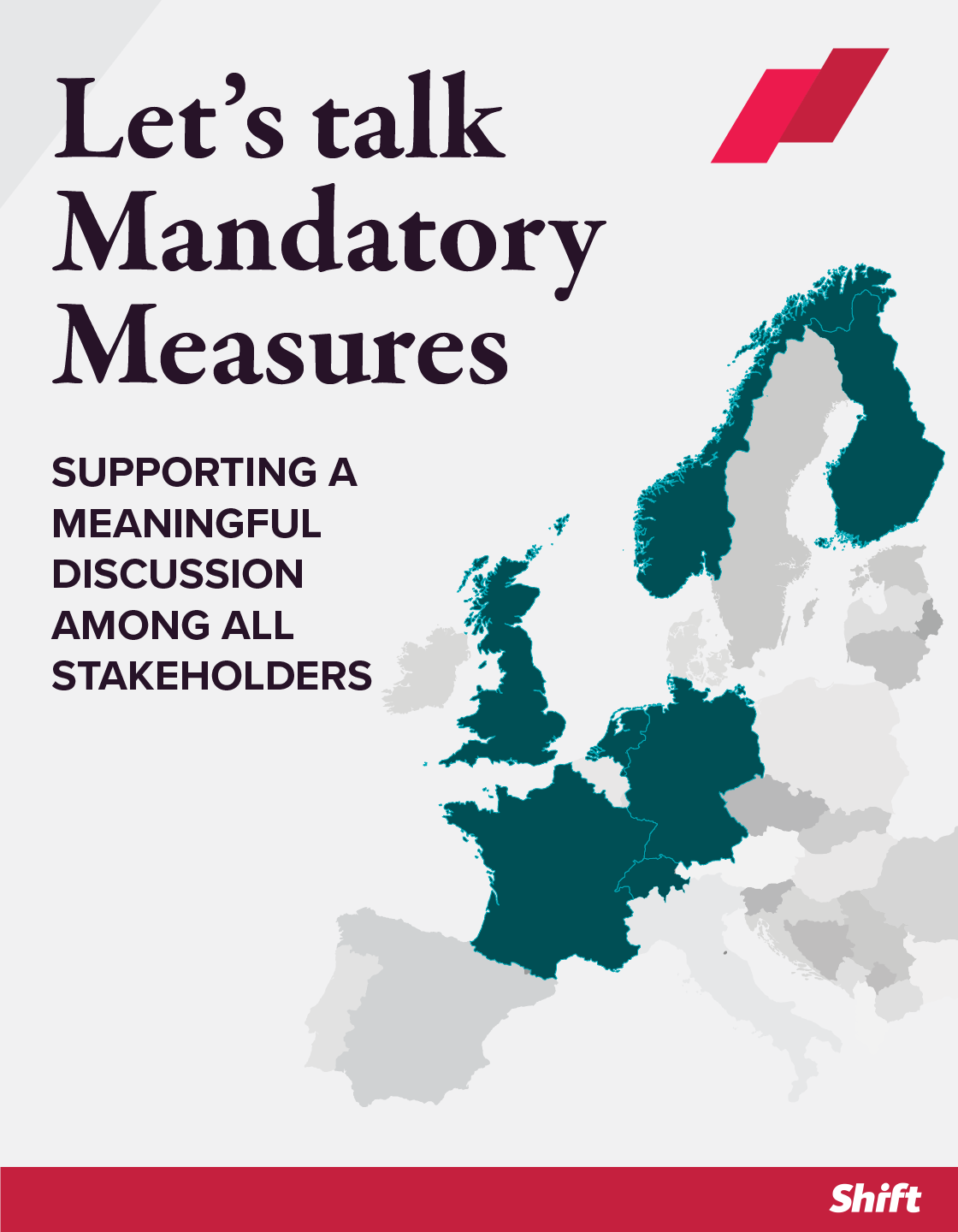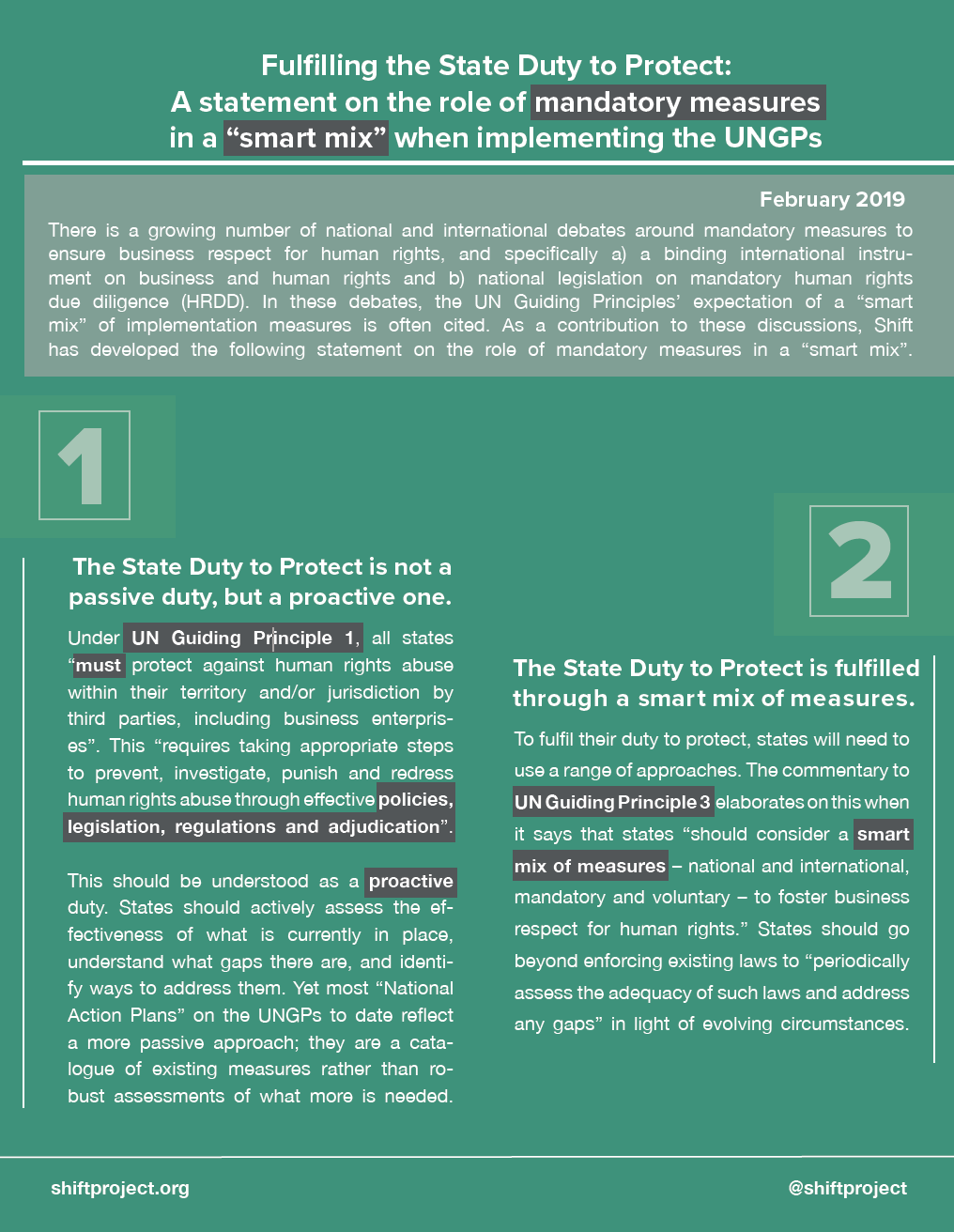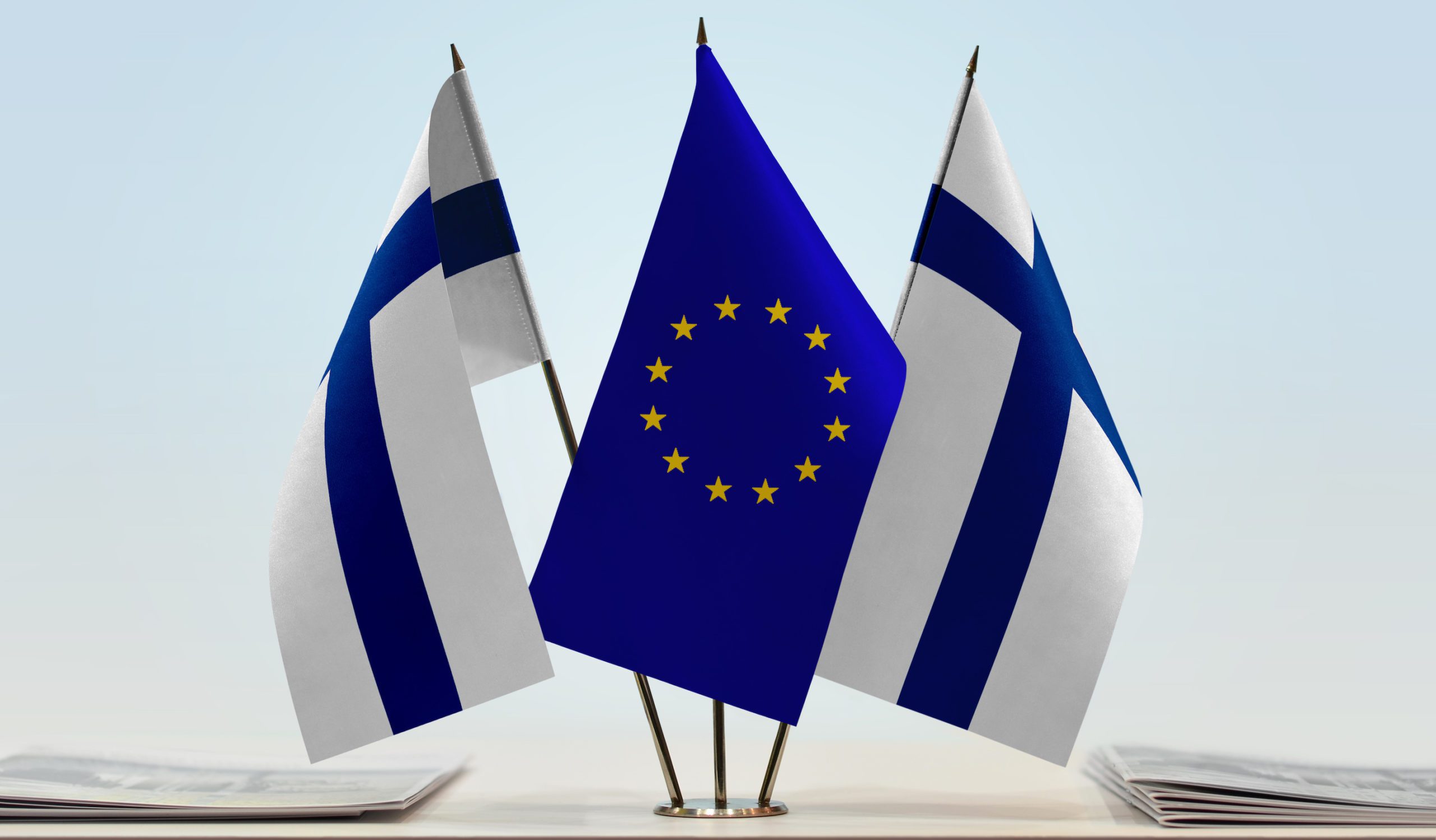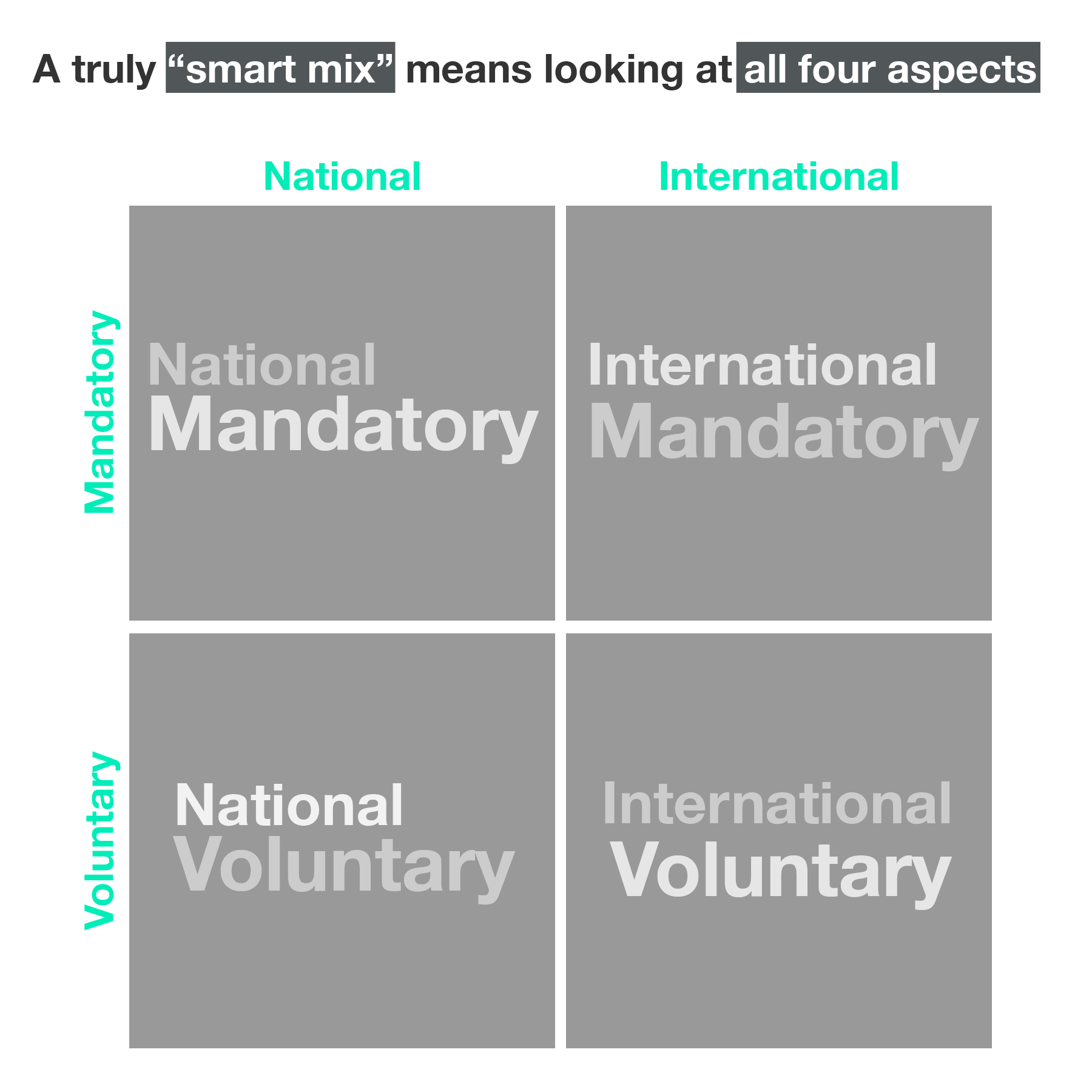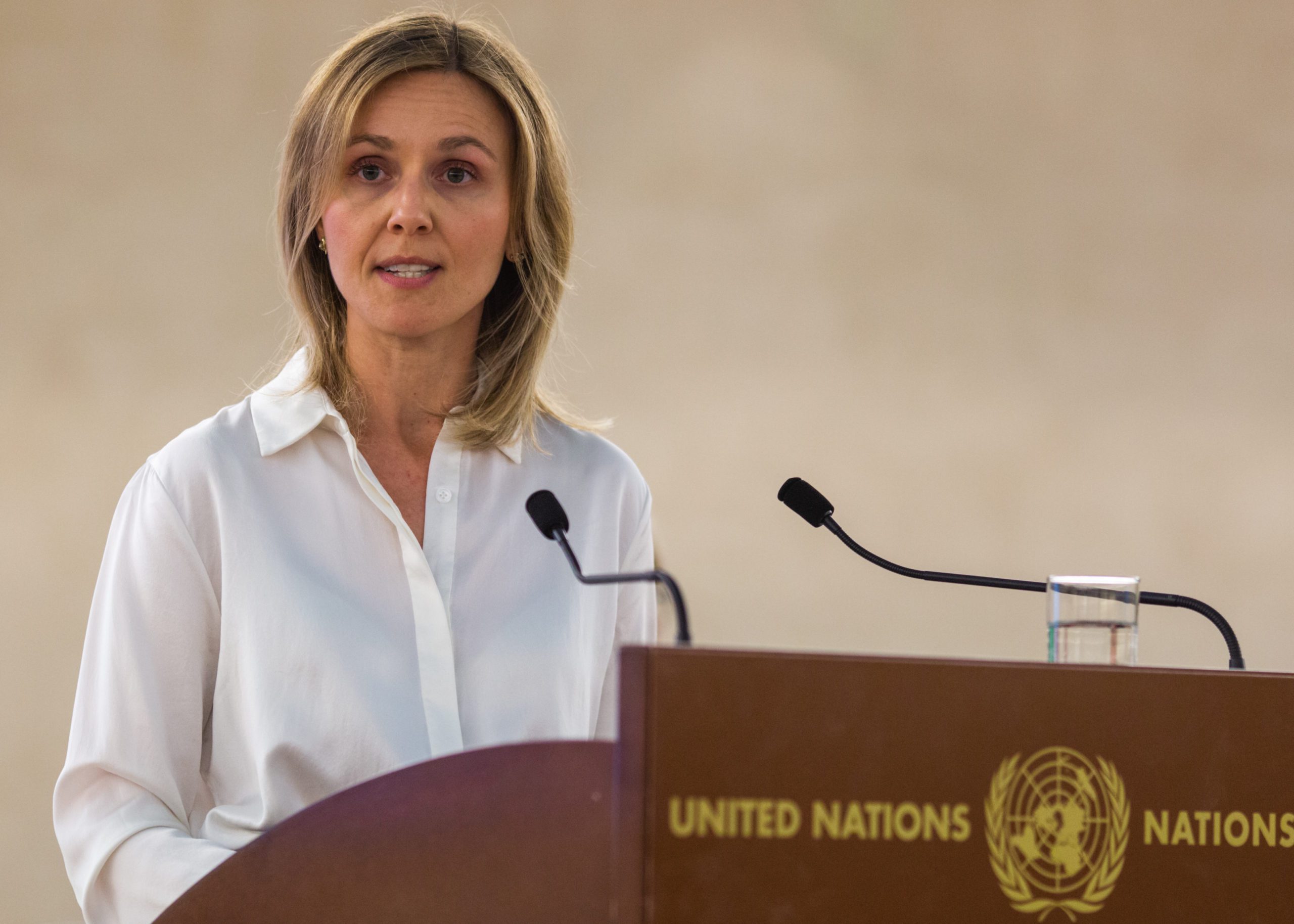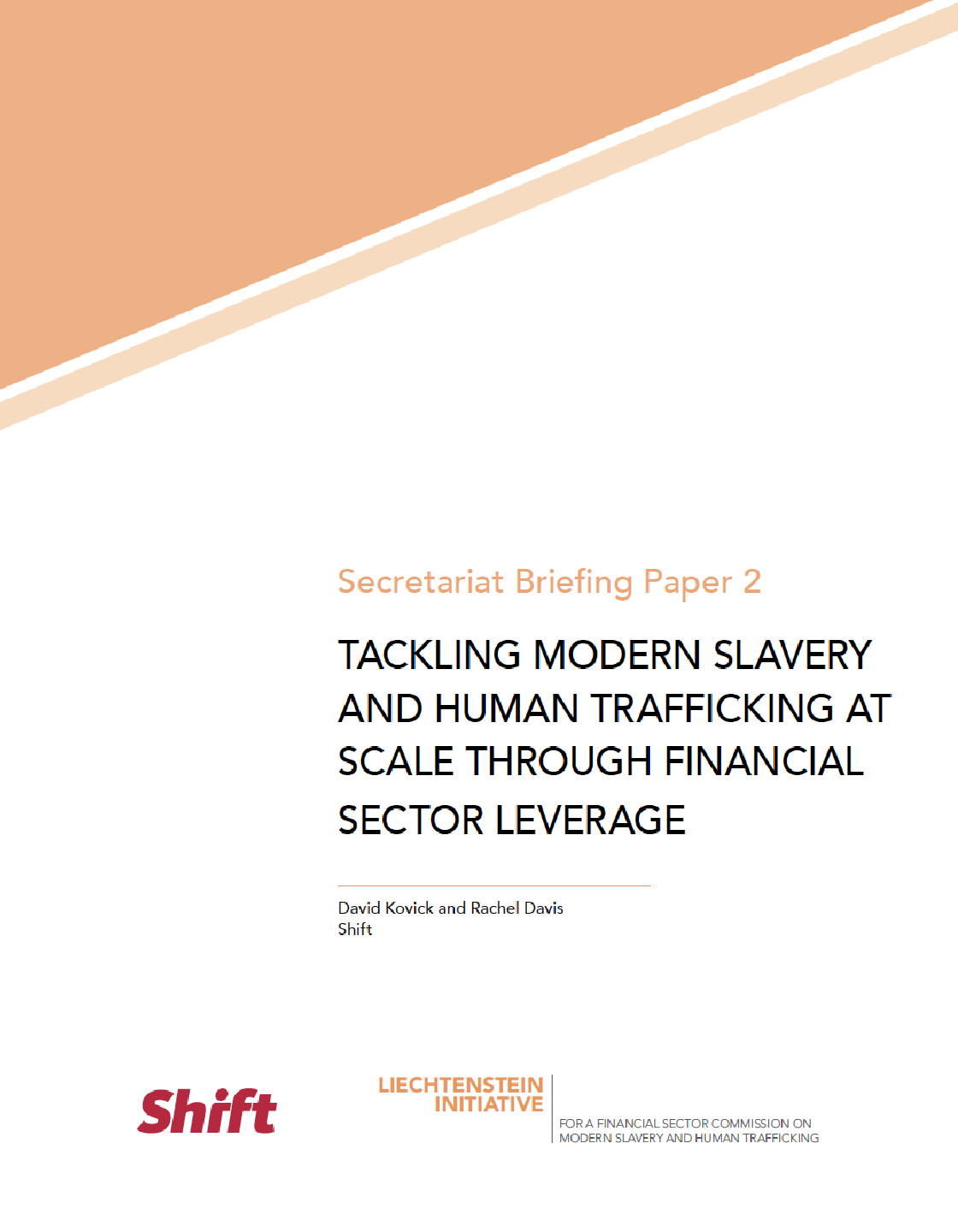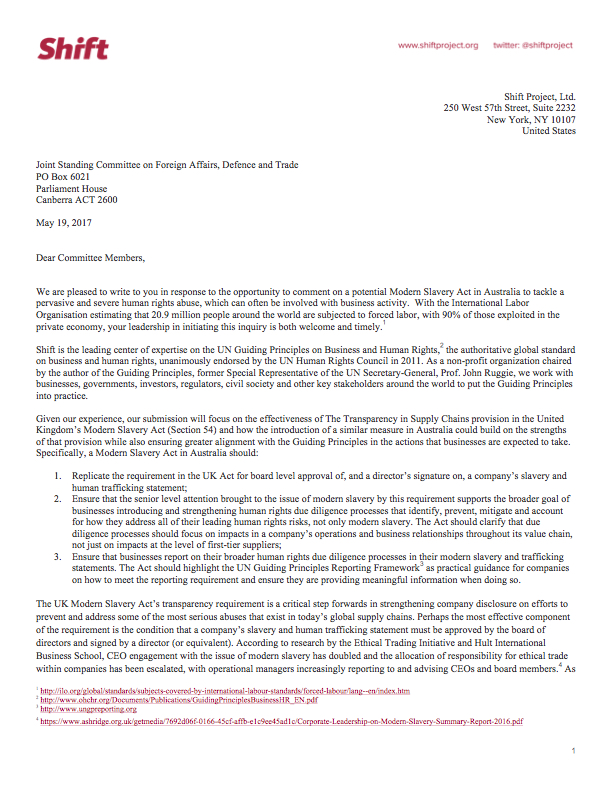Below is the text Shift submitted to the Italian government as part of the public consultation. | Learn more about Shift’s engagement with regulatory and policy developments
Submission for the Public Consultation on the Italian National Action Plan on Business and Human Rights
Shift is pleased to submit these recommendations to the Italian
Government as part of its public consultation on the revision of its
National Action Plan on Business and Human Rights (“NAP”). We support
the initiative of the Government to review and build upon its first NAP
and further its commitment to implementing the UN Guiding Principles on
Business and Human Rights (“UN Guiding Principles”). The revision of the
NAP should encourage greater uptake of the UN Guiding Principles in
Italy and facilitate stronger cooperation between companies, government
institutions and their stakeholders.
As one of the first countries to develop a NAP on the UN Guiding
Principles, the Italian Government now has the opportunity to assess the
effectiveness of its approach to date. Owing to the fact that many
goods and services found around the world are produced by Italian
companies – which operate both within Italy and abroad – the revision of
the NAP is also an important opportunity for the government to show
critical leadership on business and human rights.
This submission responds to the draft published by the
Inter-Ministerial Committee for Human Rights (CIDU) at the Italian
Ministry of Foreign Affairs and International Cooperation. It addresses
three areas that we believe are particularly important in considering
the revision of the NAP:
- Advancing the State Duty to Protect, in Italy and Abroad
Suggestions on advancing business and human rights within the institutions of the Italian Government, both in Italy and abroad.
- Facilitating the Corporate Responsibility to Respect
Assisting and where appropriate requiring Italian companies to respect human rights throughout their operations, including through the use of formal reporting that helps to drive improved performance.
- Improving Access to Remedy
Further building capacity within the Italian Government in understanding the UN Guiding Principles and responding to cases involving business-related violations of human rights, both within Italy and through the impact of Italian business abroad.
Further building capacity within the Italian Government in
understanding the UN Guiding Principles and responding to cases
involving business-related violations of human rights, both within Italy
and through the impact of Italian business abroad.
1. Advancing the State Duty to Protect
The National Priorities set out in the draft NAP suggest an ambitious
program to tackle several key areas that pose significant risk to human
rights. We welcome the inclusion of issues such as dealing with
irregular or grey work (ex. caporalato) in the agricultural sector
within Italy, and bolstering human rights in Italy’s development
cooperation.
In strengthening the NAP, there are several areas which could be
explored at greater length to highlight the role and responsibilities of
Italian companies in respecting human rights through their business
operations and business relationships. One particular instance includes
the “Legality Law” (or “Rating”) and its strength in addressing a company’s respect for human rights.
At present, the “Rating” is assigned in the form of a certificate
released by the Italian Antitrust Authority as a certification of
adhering to various aspects of responsible business. Designed to
evaluate business ethics, banks and other financial institutions in
Italy may consider a company’s rating in granting access to finance. Yet
at present, the rating process and indicators used to measure ethical
standards of firms do not require companies to proactively seek to
address or mitigate human rights risks in their supply chains, whether
their operations are within Italy, our outside of the European Union.
- A government-sponsored certification scheme connected with
responsible business conduct provides a natural opportunity for
companies to demonstrate how they seek to respect human rights in line
with the UN Guiding Principles. In order to strengthen the consideration
of respect for human rights as part of the rating’s evaluation of
responsible business conduct, we encourage the Italian Government to
explore how to link “human rights due diligence” to the criteria.
A growing number of national Development Finance Institutions (DFIs) and Export Credit Agencies (ECAs)
are bringing a human rights lens to bear on their existing
environmental and social due diligence, including by adopting new
policies and human rights due diligence procedures informed by the
expectations of the UN Guiding Principles. Given this context, we are
pleased to see that the NAP references both SACE, the Italian ECA, and
SIMEST, the Italian DFI. Drawing on our work with the IFC, as well as
with various countries’ ECAs (such as those of Norway and Canada) and
DFIs (such as those in the Netherlands, Germany and France), we see a
growing number of financial institutions strengthening their existing
environmental and social due diligence approaches to incorporate human
rights due diligence more directly. This is first and foremost about
preventing risk to people, but it can also help prevent risk to the
investments at issue.
- A general focus on conducting social and environmental impact
assessments, as currently set out in the NAP, is likely to be
insufficient to fully explore human rights risks connected to individual
clients or transactions. We encourage the Italian Government to commit
to reviewing the existing approaches of SACE and SIMEST through the lens
of human rights due diligence and identifying how to proactively
incorporate human rights due diligence into their approaches. This will
be essential as part of Italy’s implementation of the revised OECD
“Common Approaches” for all OECD member states’ ECAs.
- We also urge the government to build the capacity of the Italian
Trade Agency (ICE) to deal with business and human rights and
understand the breadth of the UN Guiding Principles in operationalizing
trade support and promotion, following the lead of other countries such
as the UK.
Shift is pleased that the Italian NAP includes critical reference to both state owned enterprises (SOEs) and public procurement.
Just as businesses are expected under the UN Guiding Principles to
include their supply chains in their human rights due diligence
processes, so too should the government, including its (public)
enterprises. A tangible step would be to require suppliers to
demonstrate that they have adequate human rights policies in place as
well as the necessary processes to identify and address the most severe
risks to people that their operations may pose. Given the large number
of suppliers to the Italian government and its SOEs, those suppliers
whose sectors, countries of operation, products or services are known to
carry particularly significant risks to human rights could be
prioritized for scrutiny. This would align with the approach being taken
by the world’s biggest procurer of goods and services, the US Federal
Government, through the Federal Acquisition Regulation requiring due
diligence in relation to the risks of slavery and trafficking in the
supply chain.
Shift welcomes the progress in transposing the 2014 EU Procurement
Directives that allows contracting authorities to take into account
social considerations. At the same time, we believe that more is needed
to ensure that human rights are appropriately considered when purchasing
goods, works and services. As indicated in the NAP, the Italian
Anti-Corruption Authority (ANAC) has a leading role here. While
anti-corruption is crucial to responsible business conduct, it is also
closely associated with heightened human rights risks.
- We recommend that the Italian Government take advantage of the
transposition process to commit to develop clear guidance for relevant
authorities on how to integrate consideration of human rights into the
bidding process for public sector contracts, beyond anti-corruption
risks alone, as well as what the appropriate consequences should be
where human rights are not respected in practice by business suppliers.
- In supporting the uptake of the social and environmental
amendments to the Procurement Directive, Shift recommends that the
Italian government provide support to public authorities on procurement
within the context of business and human rights. Other countries have
developed, or are in the process of developing, guidance and e-learning
tools on this topic which could be built on.
With Italy’s long industrial and commercial history in certain
sectors, human rights risks may be particularly relevant in some of
those sectors such as agriculture and textiles. In terms of the former,
addressing the caporalato is a welcome initiative. Undeclared,
grey or seasonal work which is not supported by decent work measures can
result in extreme risks to people and also in material risks to
enterprises themselves. In relation to the textiles sector, there are
known human rights risks in the textile supply chain, including for
luxury brands, within Italy. In addition, a high concentration of firms
within – or associated with – the textile sector in Italy increasingly
source from countries outside of the European Union, which can pose
different and additional human rights risks. Shift is aware that a
number of leading Italian companies associated with the textile sector
would welcome greater guidance and support on how to meet their
responsibility to respect human rights.
- Shift recommends that the Italian government, supported by the
Italian Ministry of Foreign Affairs, Ministry of Economic Development
and the Ministry of Labour and Social Policy, provide sector-based
support to businesses that pose the highest risks to human rights (for
example in agriculture and textiles), looking both at domestic risks as
well as risks in business relationships/supply chains abroad.
Regarding development cooperation, the recently
reformed Italian Agency for Development Cooperation (AICS), linked to
the Italian Ministry of Foreign Affairs, provides an excellent
opportunity to align Italy’s development agenda – including its
commitment to the Sustainable Development Goals – with decent work in
global supply chains. Further, Italy committed to supporting a better
application of labour, social and environmental standards in global
supply chains at the the G7 in Elmau, Germany in 2015. These commitments
also reflect the EU Council Conclusions on Responsible Global Value Chains, agreed upon by all EU Member States in May 2016. Shift welcomes the suggestion that this might be a priority area of work.
- We urge the Italian government to extend the expectation of
human rights due diligence to AICS’ technical areas of economic
development (i.e. private sector development and trade), human
development, rural development and environment/natural resources. The
current horizontal focus on human rights with respect to gender and
youth is notable, however business and human rights extends far beyond
these areas. The various technical areas/work steams could be
strengthened to include reference to business and human rights and
decent work. These measures could also link to sectoral initiatives as
suggested above (such as in agriculture and textiles).
2. Facilitating the Corporate Responsibility to Respect, in Italy and Abroad
States have a range of tools at their disposal to encourage,
incentivize and require companies to respect human rights. This
includes, as Guiding Principle 3(d) makes clear, the role of the state
to: “Encourage, and where appropriate require, business enterprises to
communicate how they address their human rights impacts.” There have
been several significant developments on human rights reporting in
Europe and the United States, including the EU Directive on
Non-Financial Information Disclosure 2016, the UK Companies Act 2006 and
the UK Modern Slavery Act 2015. In the US, the California Transparency
in Supply Chains Act 2010, the Dodd-Frank Act’s provisions with regard
to conflict minerals due diligence, and the State Department’s Myanmar
Reporting Requirements have all contributed to heightened expectations
of companies.
Disclosure requirements can help drive accountability and improved
performance: they focus senior management minds on what the company is
(or is not) doing, and they provide the information necessary for better
engagement by the company with stakeholders on how it is managing its
human rights impacts. But they only do so if the expectations for
disclosure are meaningful. To date, human rights reporting has been by
far the weakest area of company reporting. This is a key reason why
Shift, together with our project partner the international accountancy
firm Mazars, led the development of the UN Guiding Principles Reporting Framework.
The Reporting Framework is the first comprehensive guidance for
companies to report on how they respect human rights in line with the UN
Guiding Principles. As Professor John Ruggie stated at its launch, “The
business community very strongly endorsed the UN Guiding Principles
when they came out, but until today they haven’t had the actual
reporting tool that enables them to know and show that they respect
human rights.”
The Reporting Framework is designed to help all companies, regardless
of size, sector or operating context, to see how far they have
progressed in implementing their responsibility to respect human rights
and how to communicate that publicly. The Framework is organized
according to a phased approach that incentivizes companies to improve
over time. It also includes linkages to other broader reporting
frameworks, including those of the Global Reporting Initiative, the
International Integrated Reporting Council and UN Global Compact, and
issue and industry-specific initiatives to show how responding to their
requirements can help answer questions in the Framework.
Since its launch, the Reporting Framework has received strong support
from a broad range of stakeholders including businesses, civil society
and other EU Member States. A current summary can be found on the website. Importantly,
the UNGP Reporting Framework has the support of an investor coalition
representing USD $4.8 trillion in assets under management worldwide, and
a number of governments have recommended (Sweden, Norway, UK) or are
considering recommending the Reporting Framework in their NAPs. The UN
Working Group on business and human rights supported the development of
the Reporting Framework.
The translation of the UNGP Reporting Framework has been made
possible by a number of organizations and governments. Support has been
received for translations into French, Spanish and Chinese. Funding from
the German government has allowed for its translation into German and a
Polish translation has been facilitated by the Polish Institute for
Human Rights and Business (PIHRB). Shift is actively exploring
translation opportunities beyond these languages, subject to funding.
- We urge the Italian Government to consider the particular
relevance of the UNGP Reporting Framework in providing guidance to
companies with regard to the human rights requirements of the EU NFI
directive and the provisions of the “Legality Law/Rating.” We also
invite the Government to consider recommending the use of the Reporting
Framework to Italian companies more broadly as a tool to help them meet
their responsibility to respect human rights under the UN Guiding
Principles.
3. Improving Access to Remedy
Guiding Principle 25 affirms the need for effective state-based
remedy, both judicial and non-judicial, as the foundation of a wider
system of remedy for business-related human rights harms. Guiding
Principle 26 identifies common legal and practical barriers to accessing
judicial remedy for such harms.
Guiding Principle 26 could only address barriers to judicial remedy
in very broad terms because their precise nature, and the most
appropriate solutions to them, must necessarily be determined at the
national level. Doing so requires detailed analysis and review of the
existing situation, taking into account broader access to justice
considerations that go well beyond the business and human rights sphere,
and will necessarily involve difficult judgments. Yet it is essential
to meeting the duty to protect in practice. It is therefore very
concerning that no existing NAP fully engages with this principle. The
recent EU Council Conclusions on Business and Human Rights have
reaffirmed this notion, and called upon EU Member States to proactively
address the issue of remedies for victims of business-related human
rights abuses within their National Action Plans.
Further, in March 2016, the Council of Europe (CoE) adopted recommendations for CoE Member States on human rights and business (Recommendation CM/Rec(2016)3 on human rights and business). The reccomendations provide specific guidance to assist CoE Member States, of which Italy is an actice member, to prevent and remedy human rights violations by business enterprises. The reccomendations illustrate a recommittment to meaningful action on access to remedy, specifically access to judicial remedy. In addition, the Office of the UN High Commissioner for Human Rights’ Accountability and Remedy Project has developed concrete guidance for states on how to advance implementation of the UN Guiding Principles’ provisions on state-based remedy.
In terms of non-judicial state-based remedy, it is
important that negative findings by such mechanisms are linked to
meaningful consequences for the businesses involved. A recent example
can be found in the revised Canadian Extractive Sector CSR Policy, which
formally links poor corporate performance and refusal to cooperate in
various dialogue processes, including those of the Canadian National
Contact Point (NCP), to limitations on export credit and other official
trade promotion support.
- We urge the Italian government to specify concrete steps with
regard to reviewing and addressing any gaps in access to state-based
remedy, including judicial remedy. We also encourage the Government to
consider appropriate consequences for companies that refuse to engage
with the Italian National Contact Point or are subject to negative
findings and do not take the necessary steps to address the concerns.
For example, such instances should inform decision-making by SACE and
SIMEST.
In closing, we appreciate the opportunity to make this submission and
would be pleased to provide any further information that may be of use.

